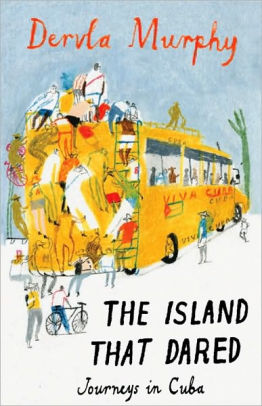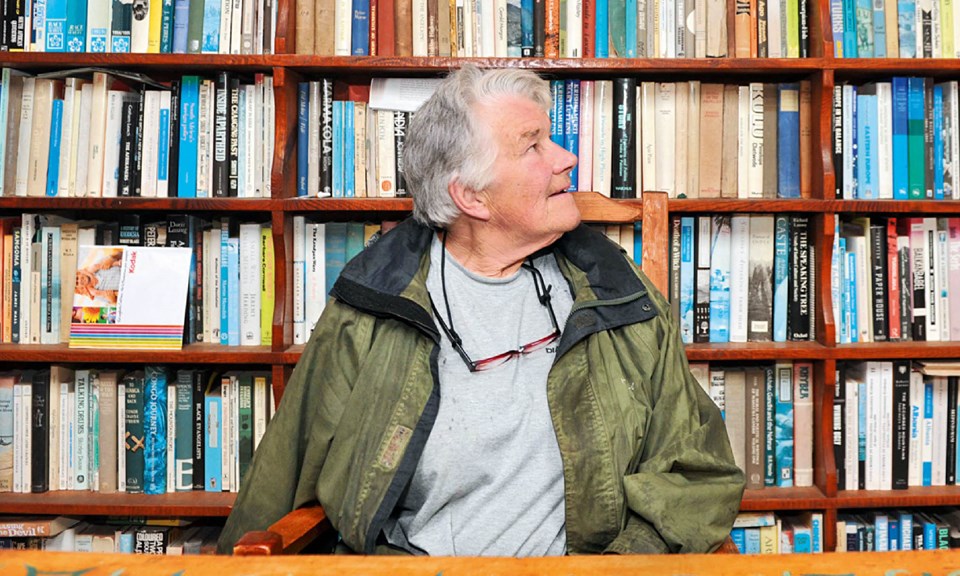I’ve often claimed that my personal library contains more than 500 books on Cuba. Well, I’m currently moving house and that inspired me to count as I boxed up my books. I erred: I have 431 Cuba-related texts, and can fairly claim to have read three-quarters of them.
Strangely, I discovered that I have two copies of Dervla Murphy’s The Island that Dared: Journeys in Cuba (published in 2008). And stranger still, for some inexplicable reason both have sat on my shelves, gathering dust, unread for maybe a decade. So here, dear reader, is a belated review…
The worst I can say about this masterful travelog is… I hate the cover, which bears no resemblance to Cuba whatsoever and is more fitting for a book about India or Haiti. A petty point, maybe. But beyond the dismaying cover, Murphy’s 404-page literary travelog is a delight, although the lay reader not fixated on Cuba–as I am–may begin to feel like they’re wading a bit deep in political mud by the closing chapters. Of which, more anon.
This thoughtful, entertaining, and illuminating account by Ireland’s most famous adventurer and famously independent travel writer describes a triptych of journeys to Cuba.
In The Island that Dared, Murphy–most famous as a tireless bicyclist and trekker–first travels to the enigmatic island nation in 2005 on a family holiday with her daughter and three granddaughters. Ever iconoclastic, grandma soon has the kids hiking (gladly, I might add) in insufferable heat along a barren shore, and even sleeping on the pebbly beach beneath a barrage of rain and mosquitoes. Murphy returns twice, in 2006 and 2007, to explore the isle more or less end to end solo.
There are many fine travelogs about Cuba to chose from. But this is as close as any writer has yet come to experiencing Cuba a lo cubano–as the Cubans. There’s hardly a cola (queue) Murphy sees that she can’t resist joining. She shuns tourist buses (as much as possible) and taxis and rental cars (heavy forbid!) in favor of camiones (crude truck-buses) and the roadside botella (hitch-hiking), the wiry septuagenarian withering in the heat stoically, without whinging. And forget hotels. When not sharing homes with campesinos (peasants), many is the night Murphy literally sleeps under the stars (by choice of course), often tormented by insects and hunger at the end of a day wandering alone in the thickly forested mountains. Her resilience and resourcefulness–vintage Murphy!–and, I should note, her keenly anti-materialistic mores, are tailor-made for being able to roll with the punches and expound on the “quintessential” Cuban experience as if born to this quirky isle.
I’ve authored four travel guidebooks to Cuba and have traveled the isle end to end on many occasions, including 7,000-plus miles by motorcycle in 1996 (see MI MOTO FIDEL: MOTORCYCLING THROUGH CASTRO’S CUBA). So reading The Island that Dared, I loved being able, in my mind’s eye, to follow every single step Murphy took as she seeks out the non-touristed path and backwaters. Even the most obscure trails, such as the coastal path between Cienfuegos Bay and Girón (Bay of Pigs): Although Murphy was turned back–chased down by an authority figure on a bicycle–as she was entering a military zone, I completed that seemingly impossible (and off-limits!) track in 1996 on my big BMW R100GS enduro.
Adept at turning a deliciously descriptive phrase into an evocative cinematic takes, Murphy’s tale is at once both endearing and empathetic. Her skill with the literary narrative needs no expounding, so suffice to say that this is a classic of travel literature. But what struck me most poignantly is the degree to which her discursive back story on Cuba combines with the narrative to provide one of the comprehensive, enjoyable, and–most importantly–fair and accurate insights into Cuba of any of the 431 relevant tomes on my shelves.
In the context of Cuba, where one’s vision–imaginary, or interpreted by experience–is generally seen through one of two polar-opposite prisms, Murphy comes as close as anyone can to a representation of the Revolution, warts n’all, that’s “fair and balanced.” And I’m clearly not referring to the repugnant Fox News definition. It helps, of course, that she hails from a country that has itself suffered long years of colonial oppression (with all the historical parallels to Cuba), giving her a world view unburdened (to say the least) by U.S. (mis)representation of Cuba. She views Cuba through a prism that isn’t shaped by a clouded perspective poisoned by bitter antagonism and acerbic hatred for Castro (see my book review, OUR WOMAN IN HAVANA by U.S. Ambassador Vicki Huddlestone).
Critics of Castro’s Cuba will have little sympathy for her thoughtfully argued empathy for all that the Revolution stands for and has achieved. Yet it should be noted, she spends considerable time dissing with dissidents, even bedding (in the most conservative sense) at their homes, and as the guest of rabidly anto-Castro Cuban-American exiles (living with chauffeurs and maids in Miami, much as in their Batista-era days in Cuba). Not least, her oft-acidic pen is put to good use lamenting Cuba’s infamously pedantic and abusive bureaucracy. And she asks: “If born a Cuban, would I have had the courage of my socialist convictions and remained loyal to Castroism at the cost of my freedom to travel and write? I doubt it.” It’s a question I’ve similarly stated and answered myself.
And yet…
She delves deep in profiling how so much of the repressive nature of the Cuban government is, unarguably, a necessary response in the face of insistent hostility from the world’s mightiest nation hell-bent on toppling the Castro government (again, see my my review of OUR WOMAN IN HAVANA).
As Michael Palin has noted of Murphy, “The mix is wonderful because you’re learning things, without them being pushed at you, you’re learning things about the look of a place… the politics, things about families, about wars. They’re all part of the mix.” Thus, in The Island that Dared, Murphy travels as deeply into her background subject as she down down Cuba’s infamously potholed roads.
So thorough is her background information on history and politics–boy, you can’t get away from the politics in Cuba–that I was astounded by her meticulous research, adding considerably to my encyclopedic knowledge. Murphy roams discursively, from the treatment of homosexuals to Cuban-American terrorist actions against Cuba and ending, much to her credit, with a profile on the “Cuban Five” (this story, tragically unknown to American citizens, is close to my heart: See my blog post THE LAST SOLDIERS OF THE COLD WAR).
Murphy profiles sympathetically a Fidel and a Revolution that cares foremost for social justice and the forgotten underdog (her rabid distaste for materialist consumerism, for capitalism per se, is a forceful presence). Castro is treated throughout as a hero figure; with good reason, and she does a brilliant job in laying out her case. But Murphy is a bit too smitten. She has Fidel on a pedestal (fair enough, he deserves it) without delving into his egoistic, megalomanic, and vindictive sides. Her solid grasp of the background story is tinged by a certain naiveté. Occasionally, I was startled by her lack of capacity to grasp critical insights. For example, in recounting José Martí’s death in 1895 at Dos Ríos–shot through the neck in the first skirmish with Spanish troops–she asks why, as a civilian, did he rush at the Spanish? The answer (which she fails to see) is obvious! He chose martyrdom as the first victim in during the War of Independence, fulfilling his own dictum: “To die for the fatherland is to live forever.”
It’s charming that one of the world’s great contemporary travel writers should come across so unrepentedly as a proud fellow traveler. She clearly feels the need to fill you in thoroughly on the historical and political context, perhaps too much for your average lay reader. At times, the travel narrative feels almost secondary as she engages in edifying the reader to an almost academic degree–a progression that builds noticeably, and perhaps cloyingly, towards the end of the book.
Still, The Island that Dared is a compassionately expressed evocation of this most enigmatic and compelling destinations. Authoritative. Passionate. Illuminating. And thoroughly enjoyable. It’s a complex and complete portrait of a complex isle.
“One of the most honest chroniclers of life on the planet,” adds Palin of Murphy. Indeed! Alas, now in her 80s, she’s “reluctantly retired from writing books.”



